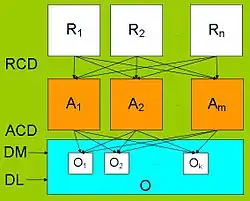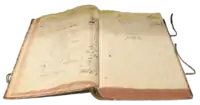Forensic accounting
Forensic accounting, forensic accountancy or financial forensics is the specialty practice area of accounting that investigates whether firms engage in financial reporting misconduct.[1] Forensic accountants apply a range of skills and methods to determine whether there has been financial reporting misconduct.[2]
| Part of a series on |
| Forensic science |
|---|
 |
|
| Part of a series on |
| Accounting |
|---|
 |
Financial forensic engagements may fall into several categories. For example:
- Economic damages calculations, whether suffered through tort or breach of contract;
- Post-acquisition disputes such as earnouts or breaches of warranties;
- Bankruptcy, insolvency, and reorganization;
- Securities fraud;
- Tax fraud;
- Money laundering;
- Business valuation; and
- Computer forensics/e-discovery.
History
Forensic accounting was not formally defined until the 1940s. Originally Frank Wilson is credited with the birth of Forensic Accounting in the 1930s. When Wilson was working as a CPA for the US Internal Revenue Service, he was assigned to investigate the transactions of the infamous gangster Al Capone. Capone was known for his involvement in illegal activities, including violent crimes. However it was Capone’s Federal Income Tax fraud that was discovered by Forensic Accountants. Wilson’s diligent analysis of the financial records of Al Capone indicted him for Federal Income tax evasion. Capone owed the government $215,080.48 from illegal gambling profits and was guilty of tax evasion for which he was sentenced to 10 years in Federal Prison. This case established the significance of Forensic Accounting.[3]
Forensic accountants
Forensic accountants, investigative accountants or expert accountants may be involved in recovering proceeds of serious crime and in relation to confiscation proceedings concerning actual or assumed proceeds of crime or money laundering. In the United Kingdom, relevant legislation is contained in the Proceeds of Crime Act 2002. Forensic accountants typically hold the following qualifications; Certified Forensic Accounting Professional [Certified Forensic Auditors] (CFA - England & Wales) granted by the Forensic Auditors Certification Board of England and Wales (FACB), Certified Fraud Examiners (CFE - US / International), Certificate Course on Forensic Accounting and Fraud Detection (FAFD) by Institute of Chartered Accountants of India (ICAI), Certified Public Accountants (CPA - US) with AICPA's [Certified in Financial Forensics est. 2008] (CFF) Credentials, Chartered Accountants (CA - Canada), Certified Management Accountants (CMA - Canada), Chartered Professional Accountants (CPA - Canada), Chartered Certified Accountants (CCA - UK), or Certified Forensic Investigation Professionals (CFIP). In India there is a separate breed of forensic accountants called Certified Forensic Accounting Professionals.[4]
The Certified Forensic Accountant (CRFAC) program from the American Board of Forensic Accounting assesses Certified Public Accountants (CPAs) knowledge and competence in professional forensic accounting services in a multitude of areas. Forensic accountants may be involved in both litigation support (providing assistance on a given case, primarily related to the calculation or estimation of economic damages and related issues) and investigative accounting (looking into illegal activities). The American Board of Forensic Accounting was established in 1993.
In 2016, the Forensic Auditors Certification Board (FACB) of England and Wales was established by the major forensic auditing and accounting bodies from across the world with its registered address in London. FACB is a professional bodies membership body comprising the International Institute of Certified Forensic Accountants (IICFA) of USA, Institute of Forensic Auditors of Zimbabwe (IFA), Institute of Forensic Accountants of Pakistan (IFAP), Institute of Certified Forensic Accountants (ICFA) of USA and Canada and the Institute of Forensic Accountants of Nigeria (IFA). FACB plays several roles and one the roles is standardization of the examination and certification of forensic auditors globally. Forensic auditors and accountants sit for one examination that is set by FACB and upon passing and meeting all the professional requirements, are awarded the credential, Certified Forensic Auditor (CFA) or the Registered Forensic Auditor (RFA) for practitioners who intend to go into public practice. All certification is renewed on an annual basis. Apart from practitioners certification, FACB is an oversight body which accredits prospective member organization before admission as part of quality checks. Persons with the FACB credential can practice as forensic auditors on a global scale.
Large accounting firms often have a forensic accounting department.[5] All of the larger accounting firms, as well as many medium-sized and boutique firms and various police and government agencies have specialist forensic accounting departments. Within these groups, there may be further sub-specializations: some forensic accountants may, for example, just specialize in insurance claims, personal injury claims, fraud, anti-money-laundering, construction,[6] or royalty audits.[7] Forensic accounting used in large companies is sometimes called financial forensics. Forensic accountants combine knowledge of the law with their accounting skills. They can assess companies, and help companies resolve issues. This can help companies prevent corruption, fraud, embezzlement, etc. A forensic accountant performing an audit of a company should remain neutral. Large companies mainly use forensic accountants when performing audits; however, there are other uses for forensic accountants in companies[8] Forensic accountants often assist in professional negligence claims where they are assessing and commenting on the work of other professionals. Forensic accountants are also engaged in marital and family law of analyzing lifestyle for spousal support purposes, determining income available for child support and equitable distribution.
Forensic accounting and fraud investigation methodologies are different than internal auditing. Thus forensic accounting services and practice should be handled by forensic accounting experts, not by internal auditing experts. Forensic accountants may appear on the crime scene a little later than fraud auditors, but their major contribution is in translating complex financial transactions and numerical data into terms that ordinary laypersons can understand. That is necessary because if the fraud comes to trial, the jury will be made up of ordinary laypersons. On the other hand, internal auditors move on checklists that may not surface the evidence that the jury or regulatory bodies look for. The fieldwork may carry out legal risks if internal auditing checklists are employed instead asking to a forensic accountant and may result serious consultant malpractice risks.
Forensic accountants utilize an understanding of economic theories, business information, financial reporting systems, accounting and auditing standards and procedures, data management & electronic discovery, data analysis techniques for fraud detection, evidence gathering and investigative techniques, and litigation processes and procedures to perform their work.[9]
This process can employ one or more of the following techniques: Review of Public records, Background investigations, Interviews of knowledgeable parties, Analysis of Real evidence to identify possible Forgery and/or document alterations, Surveillance and inspection of business premises, Analysis of individual Financial transactions or statements, and Review of Business records to identify fictitious vendors, employees, and/or business activities.[10]
Forensic accountants are also increasingly playing more proactive risk reduction roles by designing and performing extended procedures as part of the statutory audit, acting as advisers to audit committees, fraud deterrence engagements, and assisting in investment analyst research.
References
- Honigsberg, Colleen (2020-10-13). "Forensic Accounting". Annual Review of Law and Social Science. 16 (1): 147–164. doi:10.1146/annurev-lawsocsci-020320-022159. ISSN 1550-3585.
- W.S. Hopwood, J.J. Leiner & G.R. Young, Forensic Accounting, McGraw-Hill Irwin (2008), as quoted by Stephen Pedneault, Frank Rudewicz, Michael Sheetz & Howard Silverstone, Forensic Accounting and Fraud Investigation, John Wiley & Sons, Inc. (4th ed. 2017).
- kimberly.vigil (2016-03-31). "What is Forensic Accounting?". The University of Scranton Online. Retrieved 2019-09-12.
- "Forensic Auditor Courses catching up in India". business-standard.com. Retrieved 2014-05-18.
- "Service of Forensic Accountants". big4accountingfirms.org. Retrieved 2014-04-08.
- Cicchella, Denise (2005). Construction audit guide: overview, monitoring, and auditing. Altamonte Springs, FL: IIA Research Foundation. ISBN 0-89413-587-2.
- Parr, Russell L.; Smith, Gordon V. (2010). Intellectual property: valuation, exploitation, and infringement damages. Hoboken, N.J.: Wiley. pp. Chapter 33. ISBN 978-0-470-45703-0.
- Shapiro, David M. "Beyond the courtroom." Strategic Finance, vol. 97, no. 3, Sept. 2015, p. 46+. Gale OneFile: Business, https://www.northeaststate.edu:2081/apps/doc/A429090770/ITBC?u=tel_a_nestcc&sid=ITBC&xid=87cb0a01. Accessed 23 Sept. 2020.
- "Background of Fraud Auditing and Forensic Accounting", Fraud Auditing and Forensic Accounting, Hoboken, NJ, USA: John Wiley & Sons, Inc., pp. 1–37, 2011-12-20, doi:10.1002/9781118269183.ch1, ISBN 978-1-118-26918-3, retrieved 2020-09-09
- Gottlieb, CPA/ABV/CFF, ASA, CVA, CBA, MST, Mark S (2020). "Forensic Investigations & Litigation Support". ForensicAccountingNYC.com. Retrieved 2020-08-28.CS1 maint: multiple names: authors list (link)